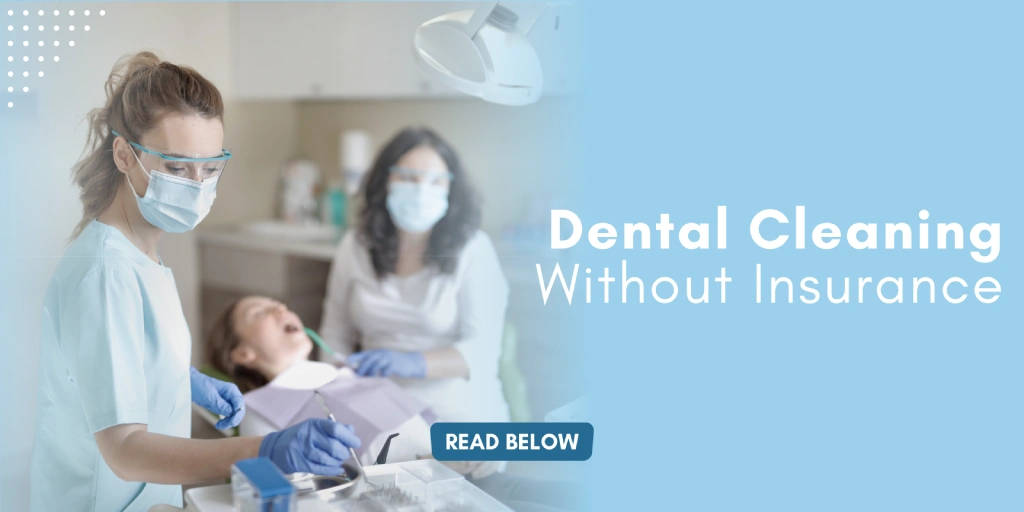
Dental hygiene is a fundamental aspect of overall health, yet the cost of dental care can be a significant concern, particularly for those without dental insurance. Maintaining good oral health is crucial for a beautiful smile and an overall healthy lifestyle. Routine dental cleanings are at the core of preventive dental care, helping reduce the risk of cavities, gum disease, and other oral health issues. However, many people are concerned about the cost of dental cleaning, especially if they don’t have dental insurance.
Why Dental Cleanings Matter
Regular dental cleanings are not only about a sparkling smile but also about keeping bacteria, plaque, and tartar at bay. Plaque is a sticky, bacteria-filled film that builds up on the teeth and, if left untreated, hardens into tartar. This buildup can lead to gum inflammation, bleeding gums, cavities, and even periodontitis – a severe gum infection that damages the soft tissue and bone supporting the teeth.
Beyond oral health, studies have linked poor dental hygiene to other serious health conditions, including heart disease, diabetes, and respiratory infections. Routine cleanings, typically recommended every six months, play a significant role in reducing these risks.
How Much Does a Dental Cleaning Cost Without Insurance?
Without insurance, the cost of dental cleaning can vary significantly based on several factors, including geographic location, the type of dental practice, and whether additional services are needed. Here’s a breakdown of what you might expect:
- Basic Routine Cleaning
For a basic cleaning, which involves removing plaque and tartar buildup, you can expect to pay between $75 and $200. This range may vary by region, with urban areas often being pricier than rural areas.
- Deep Cleaning (Scaling and Root Planing)
Deep cleaning is more intensive and necessary if you have signs of gum disease. This process, known as scaling and root planing, involves cleaning below the gum line and smoothing the roots to prevent further buildup. The cost can range from $150 to $300 per quadrant of the mouth. This means a full-mouth deep cleaning could range from $600 to over $1,200.
- Other Diagnostic Services (X-Rays, Exam Fees)
Most dental cleanings are accompanied by X-rays and a dental exam. X-rays are typically taken once per year, costing $20 to $250, depending on the type (bitewing, panoramic, or full mouth). A full exam from the dentist could add another $50 to $150 to the bill.
- Child Dental Cleaning
For children, a routine cleaning is usually cheaper, ranging from $50 to $100, depending on the area and specific dental practice.
- Polishing and Fluoride Treatment
If you want extras like polishing and fluoride treatment, these will add to the cost. Polishing can add $10 to $30, while a fluoride treatment may cost an additional $20 to $50.
Factors Influencing the Cost of Dental Cleaning
Various factors influence how much you’ll end up paying for a dental cleaning without insurance:
- Location: Prices vary by region. Dental cleanings in metropolitan areas are generally more expensive than in rural areas.
- Dental Office Type: Private practices may charge more than clinics or community health centers.
- Additional Procedures: A deep cleaning or special cleaning procedures, such as fluoride treatments, can increase the total cost.
- Dentist’s Experience: Highly skilled dentists with extensive experience may charge more for their services, as their reputation can command higher fees.
- Condition of Oral Health: If you have a lot of plaque or signs of gum disease, a more intensive cleaning may be required, which can be more expensive.
Why Do Dental Cleaning Prices Vary So Much?
The cost of dental services often depends on factors outside of just the procedure itself. Dentists have to cover expenses such as office rent, equipment, staff salaries, and sterilization costs, all of which vary significantly based on location and the type of clinic. Additionally, some practices invest in advanced dental technology and offer a higher standard of care, which can reflect in higher costs.
Can You Get Affordable Dental Cleanings Without Insurance?
If you’re paying out of pocket, here are several strategies that can help make dental cleanings more affordable:
- Dental Discount Plans
Dental discount plans work differently from traditional insurance. These plans are membership-based, requiring an annual fee that grants members access to discounted rates for various dental services, often reducing costs by 10-60%. These discounts apply to routine cleanings, X-rays, exams, and other treatments.
- Community Health Centers
Many community health centers offer low-cost or sliding-scale dental services based on income. While availability may be limited, these centers provide basic dental services, including cleanings, at a reduced cost.
- Dental Schools
Dental schools often offer low-cost services to help students gain experience under the supervision of licensed dentists. While the cleaning might take longer, it’s a cost-effective option for those without insurance.
- In-house Dental Plans
Some dental offices offer in-house plans that function similarly to dental insurance. For a fixed annual fee, these plans cover services such as cleanings, exams, and discounts on other treatments.
- Ask About Payment Plans
Many dental offices understand the financial strain of paying out of pocket. Ask if they offer payment plans that let you spread the cost over several months, making it easier to manage the expense.
- Special Promotions and Seasonal Discounts
Some dental practices offer special promotions or discounts at certain times of the year. Keep an eye out for offers like discounted cleanings or free X-rays, which can significantly reduce costs.
The Importance of Regular Dental Cleanings Even Without Insurance
Skipping regular dental cleanings can have long-term consequences, which could ultimately be much more costly than preventive care. Neglecting oral hygiene can lead to issues such as:
- Cavities: Untreated plaque buildup can lead to tooth decay and cavities, which may eventually require fillings, root canals, or even tooth extraction.
- Gum Disease: When plaque extends below the gum line, it can cause gum inflammation and even infection, leading to gum disease. Treating advanced gum disease is much more expensive than routine cleanings.
- Systemic Health Issues: Poor oral health has been linked to other serious health issues, including heart disease and diabetes. These conditions are costly to treat and significantly impact quality of life.
Routine cleanings help to prevent these issues by removing plaque and tartar, polishing teeth, and catching signs of trouble early on. In the long run, preventive dental care saves time, money, and pain, contributing to overall well-being.
DIY Oral Hygiene: Maintain a Dental Health Between Professional Cleanings
In addition to professional cleanings, maintaining a solid oral hygiene routine at home is essential:
Brush Twice Daily: Brushing your teeth for at least two minutes twice daily removes plaque and prevents buildup.
Floss Daily: Flossing is essential to reach places your toothbrush can’t, such as between teeth and along the gum line.
Use Mouthwash: An antiseptic or fluoride mouthwash can help kill bacteria and protect against decay.
Healthy Diet: Avoid excessive sugar and acidic foods that contribute to decay, and eat a balanced diet to strengthen your teeth and gums.
Regular Dental Visits: Even without insurance, try to visit the dentist at least once a year for an exam to detect potential issues early on.
The cost of a dental cleaning without insurance varies, but understanding your options and taking advantage of available resources can make it affordable. While it may be tempting to skip dental visits, especially if you don’t have insurance, investing in routine cleanings is critical for both your oral and overall health. Remember, good oral hygiene at home complements these professional cleanings, providing a solid foundation for a lifetime of healthy smiles.
